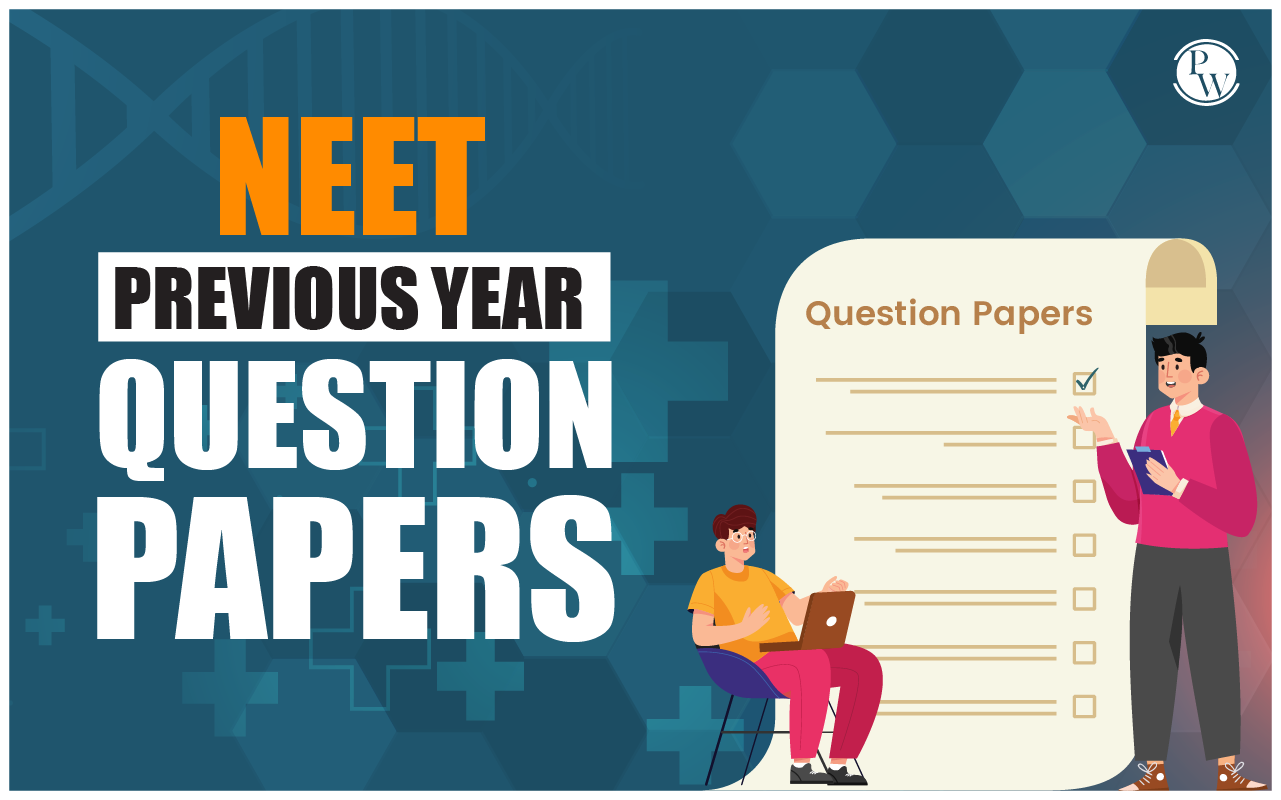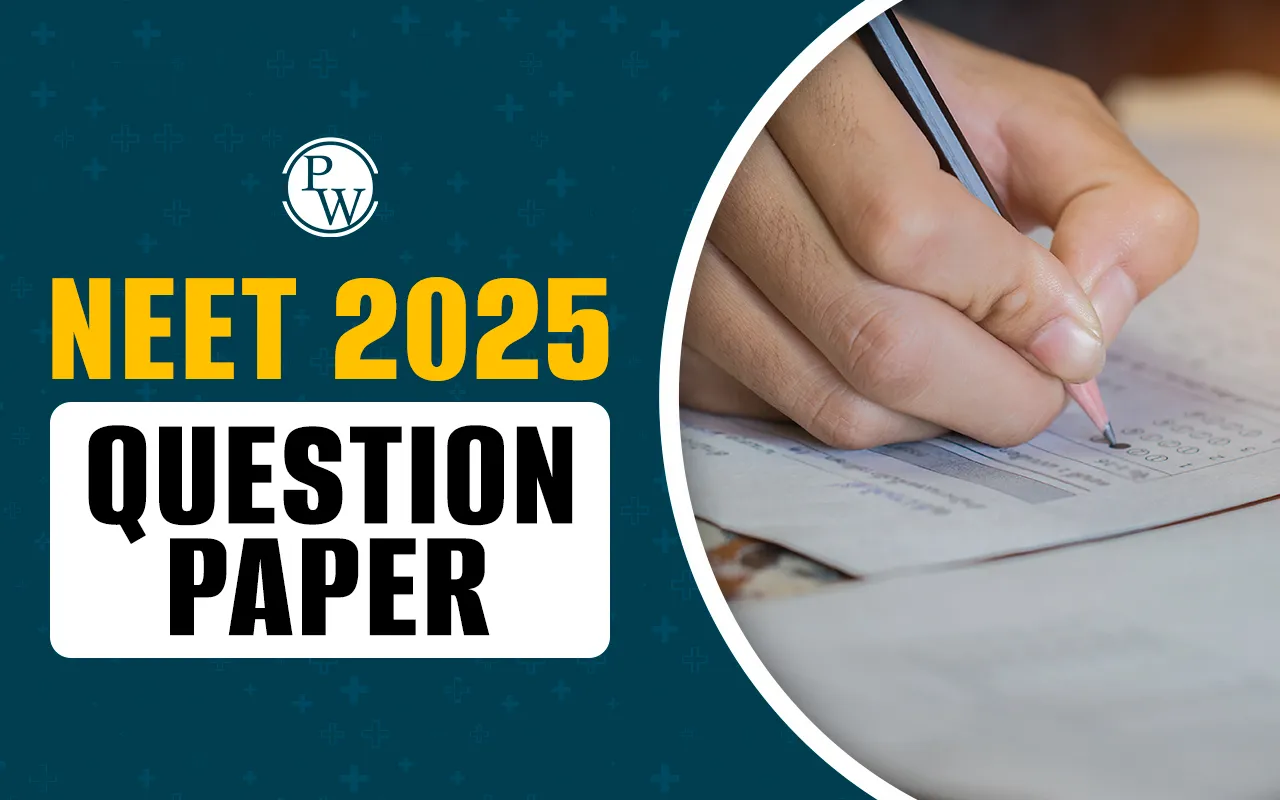
NEET 2021 Question Paper: To do well in NEET 2026, practicing past exam papers like the NEET 2021 Question Paper, is an effective strategy. It gives students a clear idea of the types of questions they can expect and helps them get comfortable with the format. Solving past papers also lets students identify areas where they need improvement and helps them manage time better during the real exam. This practice can boost confidence and readiness, ensuring they are well-prepared for the NEET exam day.
Also Check:
NEET 2021 Question Paper
NEET 2021 Question Paper consisted of multiple-choice questions (MCQs) covering the subjects of Physics, Chemistry, and Biology. The examination, conducted by the National Testing Agency (NTA) to assess the competency of aspirants seeking admission to medical and dental colleges across the country.
NEET 2021 exam took place on September 12, 2021, and its question paper with solutions is now accessible in all 13 languages. Candidates who are appearing for the upcoming NEET exam must not avoid practicing the question paper of 2021 to aid their preparation. Solving the NEET 2021 Question Paper will greatly benefit aspirants to get familiar with the style of questions and the difficulty level of the paper.
Test takers reported that the NEET 2021 Question paper was moderately difficult. Utilizing the previous year's papers can be instrumental in achieving higher scores and excelling in the upcoming exam.
NEET 2021 Question Paper PDF
In the digital age, access to question papers has become increasingly simple. NEET 2021 Question Paper PDFs are available for you to boost your preparation.
This move towards digitization has made it convenient for students to review the paper at their own pace by downloading it into PDF format and accessing it to any device like a laptop, mobile, or desktop.
The NEET 2021 Question Paper followed the prescribed format for the NEET Exam. There are 200 multiple-choice questions covering Physics, Chemistry, and Biology (Botany and Zoology) in each PDF of the NEET 2021 Question Paper.
There are two sections with 35 questions each and 15 questions each, comprising the total number of questions.
Given that the actual NEET Exam allows 3 hours for completion, students practicing with the NEET 2021 Question Paper should set a 3-hour alarm to assess their readiness for the upcoming NEET UG Exam. This will help you to understand the NEET Exam Pattern . Practicing the NEET 2021 Question Paper will enhance your readiness for NEET 2026.
NEET 2021 Question Paper PDF Download with Solutions
Getting ready for the NEET 2026 exam by solving previous years' question papers. You can easily access and download the NEET 2021 Question Paper in PDF format. This document holds all the questions you might face in the actual exam. It's like a practice kit that helps you understand the kind of questions you'll encounter.
By downloading the NEET 2021 Question Paper PDF, you can go through the questions at your own pace and get a feel for the exam pattern. It's a great way to boost your confidence and be well-prepared on exam day.
NEET 2021 Question Paper PDF Download with Solution
Download Now
NEET 2021 Question Paper with Solution
PW has shared the NEET 2021 Question Paper and Answer keys, aiding students in gauging their estimated scores. NEET 2021 question papers were categorized into four sets: M, N, O, and P, each further subdivided into 6 subsets. You can access the link here to download NEET 2021 question papers, complete with their solutions.
NEET 2021 Question Paper Language
NEET 2021 was conducted in 13 languages, including English. Interestingly, most applicants choose to use the NEET English question paper format. According to the National Testing Agency's (NTA) official data, about 80% of applicants choose the English NEET question paper. Experts and top scorers agree that one of the best ways to get ready for the test is to work through last year's NEET question papers.
NEET 2021 Question Paper Difficulty Level
There were moderate to difficult challenges in the Physics section. Notably, the Physics section became even more complex as questions based on numbers gained prominence.
Chemistry covers a wide range of difficulty levels, from simple to moderately complex questions. Examining candidates' knowledge of NCERT facts, figures, and solutions was a major focus of this section. Even though there were a lot of numerical problems in the Chemistry questions, the structure was clear and concise overall.
Now that we are in Biology, the Botany section showed a range of difficulty, from easy to moderate. This section focused primarily on using NCERT Solutions and stressed the value of having factual knowledge.
On the other hand, the questions in the Zoology section ranged in difficulty from easy to moderate. This section featured a lot of NCERT questions, which added to the NEET 2021 paper's overall diversity.
NEET 2021 Question Paper Analysis
Students can gain a thorough understanding of the NEET 2021 Question Paper's underlying structure by analyzing it. We will go over the chapter-by-chapter weighting of the three subjects that make up the NEET 2021 exam in detail here.
On September 12, 2021, 202 cities nationwide were covered by the National Testing Agency (NTA) to administer NEET 2021. It was one of the most popular medical entrance exams, with an astounding 16.14 lakh students signing up for the test. The exam was administered in about 3800 testing centers across the country, and reports indicate that almost 95% of registered candidates took part in it.
NEET 2021 introduced language flexibility, allowing candidates to select from a pool of 13 languages, which was one noteworthy feature. With a focus on regional languages as well as Hindi and English, this inclusive approach sought to accommodate the candidates' varied linguistic backgrounds.
When analyzing the NEET 2021 format, it is important to note that every topic was separated into two sections: section A had 35 questions, and section B had 10+5 questions. With this format, students could choose how to respond to any ten questions from section B, enabling them to approach the test strategically and individually.
NEET 2021 Question Paper Physics Analysis
The NEET 2021 question paper's Physics section had a moderate to challenging level of difficulty. Among all the subsections, the Mechanics subsection had the most questions around 13 in total. This year, unlike previous years, there were significantly more questions in the Physics section that involved numbers—70% of the total.
There were some extremely complex questions in this section that required a thorough comprehension of the underlying concepts in addition to having a solid knowledge base. Because they are so complex, questions about optics, semiconductors, and the photoelectric effect in particular have been identified as needing special attention.
| NEET 2021 Physics Question Paper Analysis | |
|---|---|
| Chapters | Questions Breakup |
| Modern Physics & Electronics | 8 |
| Magnetism | 7 |
| SHM & Wave | 3 |
| Optics | 4 |
| Electrostatics and Electricity | 11 |
| Heat & Thermodynamics | 4 |
| Mechanics | 13 |
NEET 2021 Question Paper Chemistry Analysis
The NEET 2021 question paper's chemistry section received an easy to moderate difficulty rating. The importance of having a strong foundation in these core concepts was highlighted by the significant number of questions in this section that were closely related to NCERT facts, figures, and tables.
There were roughly 19 questions in the inorganic chemistry section, and students who had a firm grasp of the NCERT fundamentals found this section to be fairly easy. The NCERT's core concepts served as the basis for many questions, so having a solid understanding of them is a major advantage.
The majority of the questions in this section also used a statement-based format, which assessed candidates' comprehension and application of theoretical information.
| NEET 2021 Chemistry Question Paper Analysis | |
|---|---|
| Chemistry Sections | Questions Breakup |
| Inorganic Chemistry | 19 |
| Organic Chemistry | 15 |
| Physical Chemistry | 16 |
| Detailed Break-Up of Chemistry | |
|---|---|
| Physical Chemistry | |
| Chapter | No. of Questions |
| Solid state | 2 |
| States of Matter | 2 |
| Thermodynamics | 1 |
| Electrochemistry | 2 |
| Surface chemistry | 1 |
| Solutions | 2 |
| Chemical Kinetics | 2 |
| Nuclear Chemistry | 1 |
| Mole concept | 1 |
| Atomic structure | 1 |
| Ionic equilibrium | 1 |
| Inorganic Chemistry | |
| Chapter | No. of Questions |
| Chemical Bonding | 5 |
| s-block | 2 |
| p-block | 3 |
| d and f block | 2 |
| Metallurgy | 2 |
| Environmental chemistry | 1 |
| Coordination chemistry | 2 |
| Organic Chemistry | |
| Chapter | No. of Questions |
| Some basic principles and techniques | 1 |
| Hydrocarbons | 4 |
| Haloalkanes and Haloarenes | 2 |
| Alcohol, Phenol, and Ether | 1 |
| Carbonyl compound | 3 |
| Amine | 2 |
| Biomolecules | 1 |
| Polymers | 1 |
| Chemistry in Everyday Life | 1 |
NEET 2021 Question Paper Biology Analysis
The biology portion of the NEET 2021 botany section ranged in difficulty from easy to moderate. Even though there were a few difficult and complex questions, answering them well required a solid understanding of foundational ideas. Most of the questions in this section were based on the NCERT curriculum; these included factual questions as well as ones that were based on basic botanical concepts.
All things considered, the botany section contained a wide range of questions, offering students an engaging challenge. The combination of factual and concept-based questions emphasized the value of a comprehensive preparation, with a strong grounding in NCERT materials being essential for navigating the wide range of questions in the NEET 2021 botany section.
| NEET 2021 Question Paper Biology Analysis | |
| Chapter | No. of Questions |
| The Living World | 1 |
| Biological Classification | 1 |
| Plant Kingdom | 5 |
| Animal Kingdom | 4 |
| Morphology of Flowering Plants | 2 |
| Anatomy of Flowering Plants | 3 |
| Structural Organisation in Animals | 3 |
| Cell: The Unit of Life | 2 |
| Biomolecules | 3 |
| Cell Cycle and Cell Division | 7 |
| Transport in Plants | 1 |
| Photosynthesis in Higher Plants | 4 |
| Respiration in Plants | 1 |
| Plant Growth and Development | 3 |
| Digestion and Absorption | 2 |
| Breathing and Exchange of Gases | 3 |
| Body Fluids and Circulation | 3 |
| Locomotion and Movement | 4 |
| Sexual Reproduction in Flowering Plants | 3 |
| Human Reproduction | 3 |
| Reproductive Health | 3 |
| Principles of Inheritance and Variation | 2 |
| Molecular Basis of Inheritance | 10 |
| Evolution | 1 |
| Human Health and Disease | 3 |
| Strategies for Enhancement in Food Production | 3 |
| Microbes in Human Welfare | 1 |
| Biotechnology: Principles and Processes | 6 |
| Biotechnology and its Applications | 5 |
| Organisms and Populations | 4 |
| Ecosystem | 3 |
| Environmental Issues | 1 |
NEET 2021 Question Paper Zoology Analysis
The NEET 2021 zoology section was moderately challenging. Some of the questions were surprising in their complexity, even though they seemed simple at first. In order to properly answer these questions, one had to pay close attention to the available options and the keywords that were incorporated into the questions.
One question that caught many students off guard was one that was unexpectedly included and concerned earthworms. But people familiar with the finer points of NCERT material could handle this unexpected question.
Most of the questions in this section were based on the NCERT syllabus, but a few closely related questions required a thorough comprehension to provide an accurate answer.
How to Attempt NEET 2021 Question Paper
- Allocate specific time slots for each section.
- Create a quiet environment, set a timer, and adhere to exam rules.
- Identify weak topics based on syllabus and previous performance.
- Familiarize yourself with the types of questions asked.
- Set realistic goals for completion.
- Allocate time wisely for each section.
- Prioritize quality over quantity while practicing.
- Note common mistakes and areas of confusion.
- Plan how to tackle questions you are unsure about.
- Clarify doubts with teachers or peers.
- Develop a revision schedule for previously covered topics.
How to Analyze NEET 2021 Question Paper
- Note the time taken for each section, identifying areas of strength and weakness.
- Focus on understanding and improving weaker sections.
- Recognize patterns and recurring topics, adjusting preparation strategies accordingly.
- Reflect on achieved goals, acknowledging progress and areas needing improvement.
- Analyze the time spent on each question, optimizing for efficiency.
- Understand solutions thoroughly, recognizing alternative methods.
- Track progress in overcoming errors, ensuring continuous improvement.
- Evaluate the effectiveness of your marking strategy, adjusting as needed.
- Address challenging concepts through additional study or external assistance.
- Evaluate the retention of revised topics, and strengthen weak areas.
NEET 2021 Question Paper FAQs
Q. Is the NEET 2021 question paper available for download in PDF format?
Q. Where can I find the official NEET 2021 question papers for download?
Q. Are there different sets of question papers for NEET 2021, and can I download them all?
Q. Is it legal to download and use NEET 2021 question papers for practice?
Q. What is the significance of practicing with NEET 2021 question papers?










